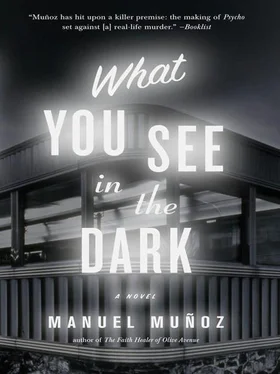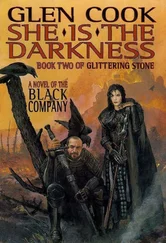“It didn’t ruin your pleasure, though, did it? You still found it funny, no?”
“I enjoy a good slapstick, so, yes — my wife and I enjoyed the episode very much. But my point is the respect you must give to the discerning eye, to people who know how to look rather than just see.” He eyed the room, studying the walls and the simple decor, not a shabby dining area by any measure. “Service able, don’t you think? For a city this size?”
“Absolutely.” She looked at the walls, painted deep blue, and the white wainscoting ringing the room. She watched in surprise as the Director lifted an edge of the tablecloth and knocked at the table, as if listening.
“That’s good solid oak for a modest room.”
“They don’t skimp around here apparently. It’s a lovely meal, isn’t it?”
“Suitable,” he said, and they ate silently for a moment, enjoying the food. “I’m very glad,” he said, “that you made the comment about not having a window in this room. I like your attentiveness.”
“A little light would’ve been nice. I always like to know what time it is.”
The Director glanced at his watch. “Say, we have a little bit of daylight left. Would you like to do some scouting with me, out on the west side of town?”
“The west side?”
“The motels. We can compare our findings with the photographer’s work from this afternoon.”
She agreed, and while they didn’t rush the rest of the meal, she begged off another glass of wine, eager to get on with the Director’s invitation. When the wardrobe mistress had spoken to her about the brassieres involved in the first scene, she’d told the Actress that she’d been asked to go around Los Angeles and think carefully about the undergarments that a secretary’s pay could afford. So here was a chance to be, strangely, just like the set decorators, to engage in the level of scrutiny they’d been asked to apply in their study of young women’s apartments in Phoenix. The details might even take the burden away from the difficulty of her performance.
They thanked the clerk at the front desk and stepped out front, where Carter, the driver, was smoking a cigarette. He stamped it out quickly and opened the car door for them, and the Director instructed him to drive out to the highway access road, where the motels were strung along in a neon line. The day was giving itself over to dusk, but the light was strong enough to allow solid views of the passing storefronts, and the Actress watched as the shops of downtown Bakersfield went by. The windows appeared small and meager to her, not like the showcases of Los Angeles, but the shops made the most of their space. In a record store window, she spotted the shiny discs hanging from the ceiling like black stars. An appliance store lined up a whole row of television sets all tuned to the same station, and the sedan drove by just as the owner began turning them off, one by one, for the night. A shoe store racked as many pairs as possible on the floor of its window display, leaving the windows open to scrutiny from the outside: a fat man stood at the front counter, chin in his hand, watching two young women scurry with stacks of thin boxes.
Gradually, the businesses turned over to gas stations and animal feed shops, small lumber stores and farm equipment repair barns, all of the various places that made up, as the Actress recalled from her own youth, the everyday landscape of small-town life. As Carter drove them out toward the access road, she got to thinking about her secretary character making a run for such a town, the desire stirring within her to seek love with a man who ran a hardware store, a business that could turn hardscrabble in a drought year, given a town like this. She pursed her lips at her own imagination, the extension she was granting to the story’s parameters. “If setting is so complicated,” she said to the Director, “I can imagine why you don’t want your players to overthink their roles.”
“Actors can interfere to a degree if they overplay. I don’t like actors placing too many emotions that aren’t there. It’s the audience that should feel sad or frightened or angry, don’t you agree? I think I’ve done my job well if the audience responds in that way.”
“If I may be so bold, then,” she said, “what, really, is there left for me to do, as an actress?”
“Well, your character has done a terrible thing. You’ve lied and you’re a thief, yet I want the audience to have some sympathy for you, to always consider you the heroine. Even when the police are chasing you, I want the audience to be rooting for your escape. How you do that will be up to you. I don’t know anything about acting. I just know who’s right for the part. Instinct tells me. So do the terms of the contract.”
She chuckled. The driver slowed down as he approached a cluster of motels, each of them announcing themselves with large neon signs already turned on against the coming dusk. The Mountainview, which faced north to the flat stretch of the rest of the Valley. The NiteNite and the Anchor Motel, surrounded on all sides by dirt and gravel.
“The Mountainview has a big, handsome sign,” said the Actress. Its large blue neon arrow descended straight down, narrowing to a point that curved to the driveway entrance and the motel’s name in bold white letters.
“Lovely facade,” said the Director. “It looks like what you’d picture if one said the word ‘motel,’ don’t you think? But the name’s all wrong.”
“I like the sound,” said the Actress.
“It’s not the sound. It’s the name. If I showed that sign on the screen, some fool in the audience is going to wonder where the mountain is.”
The Actress turned and pointed out the back window. “There’s a mountain there.”
“No, no,” said the Director. “You had to turn around to see that. It would break the composition to show that angle. You want the approach from the road, the motel sign, and then what happens in the motel. No one cares about the road scenery on the way to the place.” The Director leaned forward to get a better look at the other two motels. “Let’s go farther along the road.”
“What’s wrong with these two?”
“The NiteNite is a terrible name for an inn. Doesn’t sound very classy, does it? Even for a truck driver. And a place called the Anchor should be near water. Florida, cotton candy colors, and all that.”
Not much farther down the access road, a large, assuming rectangular sign came into view: watson’s inn, it read, and the Director tapped on the front seat to get Carter to slow down.
“Should I pull in?” Carter asked.
“Why not?” said the Director, even though the driveway was quite close to the front office. The driveway was level with the road, rather than sloped downward as at the other motels, and though the parking lot looked tight, there was plenty of space for larger trucks. Two long buildings sat at V-shaped angles to each other, facing the traffic, a front porch running along the entire length of each facade, the windows of each room with curtains pulled back to let in the light. In the gap between the buildings, a glimpse of two more units facing the other direction, away from the road, quiet.
“This one is perfect,” said the Actress with assurance.
The Director stayed silent, but he was clearly taking it in. Carter idled for a moment before the Actress nodded at him slightly to put the car in park and cut the engine. When the motor shuddered quiet, the silence broken only by the occasional passing car, the Actress knew she’d picked the right one.
“I do hope the photographer spotted this one,” the Director said. “You’ve got a good eye.”
Over to the side, from a small house with its facade angled toward the motel buildings, a screen door swung open, and a woman stood on the steps looking at them for a moment before starting down to greet them.
Читать дальше












